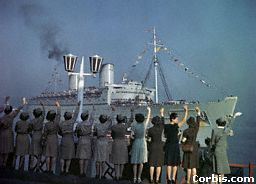Over Here, Over There
Introduction | Perception
of the Enemy | News of
the War | Keeping
in Contact | Re-entry
into the Community | Notes | Main
Index
Re-entry into the Community
WWII had come to an end by the fall of 1945. By this time the United States
had established victory in both Europe and the South Pacific and troops began
to return home in mass. The re-entry into the community occurred in surges.
The initial emotion was that of great joy for both soldiers and the community.
Grace Butkus recalled, "I remember
going up to the depot, and the… guys were hanging out the window and they
were screaming and yelling. It was so exciting, and I was waiting for my brother.
Yup, Hallelujah." (Butkus).
The fervor surrounding the troops' homecoming was electric and beyond patriotic
excitement, people were simply happy to be with loved ones again.
 Although
long awaited and highly anticipated, some soldiers found their re-entry into
the community to be a bittersweet experience, to say the least. Soldiers had
completed a great task and re-entered Quinsigamond with a great deal of respect
and honor, but their glory and America's ultimate victory had come at a mighty
cost. Despite the joy of being home, a dark cloud accompanied many soldiers'
journey back to the village. The loss of many friends and loved ones in the
carnage abroad was gravely felt at home. Herbert
Berg remembers well his re-entry into the Village neighborhood. "There
weren't any celebrations, just a lot of thought about the waste that had gone
on--human waste." For Berg,
the war was simply a national task that had to be completed. "Well, of
course I was quite upset about [the bombing of Pearl Harbor] as I'm sure everybody
was. I wasn't really ready to go right away…. But, uh, the thing had to
be, so it had to be." Berg went on
to say, "99% of us there were civilians wearing a uniform…. We wanted
to get it over with and come home again to live like human beings." Beyond
the glory, there was a normalcy of life to which soldiers wanted to return at
home.
Although
long awaited and highly anticipated, some soldiers found their re-entry into
the community to be a bittersweet experience, to say the least. Soldiers had
completed a great task and re-entered Quinsigamond with a great deal of respect
and honor, but their glory and America's ultimate victory had come at a mighty
cost. Despite the joy of being home, a dark cloud accompanied many soldiers'
journey back to the village. The loss of many friends and loved ones in the
carnage abroad was gravely felt at home. Herbert
Berg remembers well his re-entry into the Village neighborhood. "There
weren't any celebrations, just a lot of thought about the waste that had gone
on--human waste." For Berg,
the war was simply a national task that had to be completed. "Well, of
course I was quite upset about [the bombing of Pearl Harbor] as I'm sure everybody
was. I wasn't really ready to go right away…. But, uh, the thing had to
be, so it had to be." Berg went on
to say, "99% of us there were civilians wearing a uniform…. We wanted
to get it over with and come home again to live like human beings." Beyond
the glory, there was a normalcy of life to which soldiers wanted to return at
home.
After the brief celebrations and the initial fanfare of arriving back in the
community, life for many veterans in Quinsigamond quickly returned to normal.
George Lindberg recounts, "[My
return was] no big deal. No parades, I never was in a parade. I don't think
we ever had a party." (Lindberg)
War glory aside, the soldier's identity quickly had to be swapped for that of
a community participant and resident. In a matter of mere days soldiers had
to switch from being fighter pilots, tank men, and commanders to being fathers,
sons, and laborers. Re-entry was sudden for many with the country under economic
and social alert for a period after the war effort and there was little time
left for soldiers to readjust slowly.
Finished with the duty of military service, a new role had to be served and
several different routes were taken by people to aid the transition home. Many
men wasted no time in getting back to their jobs and the gap between returning
home from service and rejoining the workforce was nearly nonexistent for many
Quinsigamond G.I.'s. When asked whether or not he took time off after the war,
Berg insisted, "No, I went right back
to work." He was the owner of a floral shop that still survives today at
the heart of the village. He was discharged in the winter of 1944 and as he
stated, "My customers welcomed me back, and when I got in they would call."
(Berg) Other than this brief attention,
Berg maintains that it was business as
usual. George Lingberg, another veteran,
was forced to come home early from the war. He remembers the period directly
after his medical discharge and subsequent marriage.
"I got out and no sooner than I had got out I met a guy downtown that
said, hey, we need somebody at work- where I used to work at Morton company.
So I laughed it off, I say, hey I just got out of the hospital, I just got married
I got to have a little rest here. I got home and got a call to report up there
right away. Said, hey I got to have a job. So I went back and I started work
the next week. Never did get any relaxation." (Lindberg)
More than just a desire to provide routine to their newly re-established community
lives or an attempt to support the post-war economy, some may attribute the
short break between war and work to the fabled Swedish/Protestant work ethic.
Regardless of motivation, however, the speed to which many men rejoined the
workforce upon re-entry into the neighborhood is notable and played an important
role in establishing them once again as members of the community.
Many men chose to take advantage of the new benefits they had as veterans. These
included a small allowance under the G.I. Bill as well as an opportunity to
complete their education. Over eight million soldiers were educated through
the G.I. Bill (12). As veteran
Wesley Holm recounted,
"At that point people all belonged to the 52-20 Club….That means
you get $20 a week for 52 weeks from the government. Well most of us after-
well we never went 52 weeks because we went to work. But anyway, in the morning,
we'd all go over to the corner of Whipple Street and our street, and hang around
there for a while until everybody came. Probably 8 or 6 or 10 guys you know.
And we see what are we going to do today? So should we go down to the Red Sox
game. We had this twenty bucks we had to use, or should we go golfing? But what
should we do today?" (Holm).
The "52-20" club was as much about camaraderie and post-war bonding
as it was about finding a way to spend the $20 every week. Men looked to such
groups as a means to reemerge in the community with support and comfort all
while maintaining financial security. Holm,
like many other men went on to finance his college education. As he remarked,
"it was not as expensive as it is today…. I became an accountant."
(Holm) It was through education and the
G.I. Bill that he was able to re-enter the community and reestablish himself
after the war. During the post-war years, many veterans could thank the G.I.
Bill and the educational opportunities that came along with it for their emergence
into the growing middle-class of the 1950's (13).
 Although
long awaited and highly anticipated, some soldiers found their re-entry into
the community to be a bittersweet experience, to say the least. Soldiers had
completed a great task and re-entered Quinsigamond with a great deal of respect
and honor, but their glory and America's ultimate victory had come at a mighty
cost. Despite the joy of being home, a dark cloud accompanied many soldiers'
journey back to the village. The loss of many friends and loved ones in the
carnage abroad was gravely felt at home. Herbert
Berg remembers well his re-entry into the Village neighborhood. "There
weren't any celebrations, just a lot of thought about the waste that had gone
on--human waste." For Berg,
the war was simply a national task that had to be completed. "Well, of
course I was quite upset about [the bombing of Pearl Harbor] as I'm sure everybody
was. I wasn't really ready to go right away…. But, uh, the thing had to
be, so it had to be." Berg went on
to say, "99% of us there were civilians wearing a uniform…. We wanted
to get it over with and come home again to live like human beings." Beyond
the glory, there was a normalcy of life to which soldiers wanted to return at
home.
Although
long awaited and highly anticipated, some soldiers found their re-entry into
the community to be a bittersweet experience, to say the least. Soldiers had
completed a great task and re-entered Quinsigamond with a great deal of respect
and honor, but their glory and America's ultimate victory had come at a mighty
cost. Despite the joy of being home, a dark cloud accompanied many soldiers'
journey back to the village. The loss of many friends and loved ones in the
carnage abroad was gravely felt at home. Herbert
Berg remembers well his re-entry into the Village neighborhood. "There
weren't any celebrations, just a lot of thought about the waste that had gone
on--human waste." For Berg,
the war was simply a national task that had to be completed. "Well, of
course I was quite upset about [the bombing of Pearl Harbor] as I'm sure everybody
was. I wasn't really ready to go right away…. But, uh, the thing had to
be, so it had to be." Berg went on
to say, "99% of us there were civilians wearing a uniform…. We wanted
to get it over with and come home again to live like human beings." Beyond
the glory, there was a normalcy of life to which soldiers wanted to return at
home.